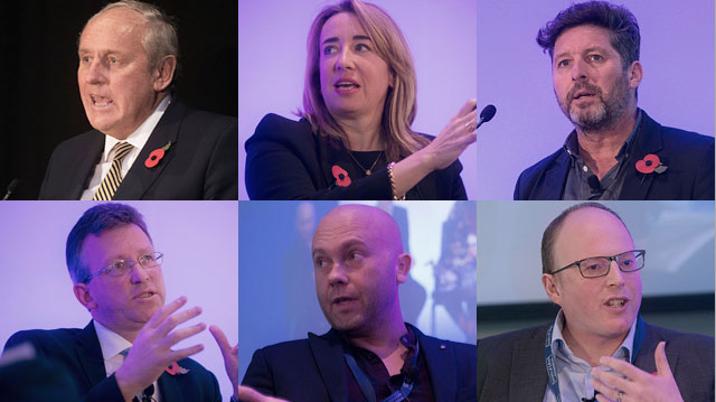
The theme of the Society of Editors conference in Salford was ‘The Trust Factor – And How To Fund It’ – but really it was the Paul Dacre show.
The legendary former editor of the Daily Mail not only received the Society’s first Lifetime Achievement award but also, in a tour de force, gave the opening keynote speech – that left some of his fellow editors more than a little bemused.
Obviously, the monopolistic tech companies were attacked and Dacre, now chairman and editor-in-chief of Associated Newspapers, believes they should be broken up. Predictable targets such as the BBC and its “subsidariat” and all the “liberal Brexit-hating media” were savaged as was Lord Leveson and all his works.
The real surprise was the scale, the length and the sheer vitriol directed towards The Guardian and its former editor Alan Rusbridger and, in particular, his memoirs, Breaking News.
Was it ten or even fifteen minutes that the Dacre big guns were trained in a relentless barrage on Rusbridger? Was there ever a saying that dog doesn’t eat dog?
The former Guardian editor’s description of the tectonic changes facing the media were acknowledged but dripping insidiously through its pages, according to Dacre, was the real message “that virtually every national newspaper in Britain is scurrilous, corrupt, and amoral with one iridescent exception. Yes, you’ve guessed it. The Guardian.”
The book manages to combine rather cloying self-glorification and moral superiority with “an almost visceral contempt of, and disdain for, the rest of the press,” insisted Dacre who also criticised Rusbridger’s decision to print the Snowden leaks, while still supporting his right to do so.
Breaking News, according to the former Daily Mail editor, contains “some of the most unpleasant ad hominem attacks on individuals that I have ever read in a work about Fleet Street”.
Then there was what Dacre called the memoir’s greatest omission – ignoring one of the most fascinating media stories of recent years: “how a dramatic putsch by an utterly demoralised staff, deposing an incoming Scott Trust chairman after the once-profitable Guardian had been reduced to an economic basket case by vanity, hubris and eye-watering financial misjudgements.”
And so it went on …
Right of reply
The current editor-in-chief of The Guardian, Kath Viner, was asked after her own presentation, what she thought of the Dacre attack.
“Why is he so obsessed with The Guardian”, was her simple reply. She also said that Rusbridger had been a fantastic editor to work for and one who had “understood and embraced the digital revolution”.
Another main speaker, Lloyd Embley, group editor-in-chief of Reach, noted that two significant words were missing from Paul Dacre’s long address – ‘Geordie’ and ‘Grieg’, the name of the remainer who has replaced Dacre as Daily Mail editor.
In a further irony, Dacre, a huge supporter of print, had to go digital and look at Mail Online to read coverage of his speech after it apparently failed to make the main paper.
At least Dacre, who did not take questions after his address, sought to reveal the literary origins of his notorious ‘Enemies of the People’ headline directed at the judges of the High Court who ruled that parliament should have a say in the triggering of Article 50 that began the UK’s process of departure from the EU.
Critics have noted that Nazi newspapers in 1930s Germany used such headlines to describe judges of the time.
Dacre claimed that critics had failed to notice that the headline was a reference to An Enemy of the People, a relatively obscure play by Norwegian playwright Henrik Ibsen.
With delicious irony, further clarification came from Guardian reader Angela Barton who questioned in the paper’s letters page whether Dacre had really got the significance of the play’s protagonist.
“Stockman, the eponymous Enemy of the People, was so branded because as an honest and ethical man he insisted on speaking truth that others did not wish to hear. Like the judges in fact. So where does Dacre actually stand?”, Barton asked.
Dacre’s final word on the subject was to concede that the headline could have been phrased better, before adding: “But what the hell. The point needed to be made.”
Envy of the world
The latest secretary of state for Digital, Culture, Media and Sport, Jeremy Wright, had nice things to say about “our press” – and the fact that it enjoyed “a level of trust and freedom that is righty envied and respected across the world”.
He conceded that the strength and sustainability of the press was something that should concern us all although “it is clear that the days of print sales and print advertising meeting the costs of quality journalism are largely behind us.”
The culture secretary, who wanted to see greater diversity in newsrooms, said it would be wrong to speculate on, or pre-judge the findings of the review into newspaper sustainability now under way, led by Dame Frances Cairncross.
And as a lawyer and former attorney general, Wright said he wanted to be sure to get the questions in the right order before doing anything.
In a hint of what was to come, the BBC media editor Amol Rajan who chaired the session commented: “Fine words – no action then.”
Keen reader
Rajan went on to ask the culture secretary what newspaper he had read that morning. The answer was none, although he always got a news digest from his staff which included columnists such as Danny Finkelstein of The Times.
Wright was then asked which magazines he bought with his own money and the reply once again surprised the editors – the only one was Time magazine of the US.
He may read Danny Finkelstein but he was then asked from the floor which women columnists had caught his eye. Answer came there none.
The culture secretary dug his hole a little deeper by becoming tetchy and saying he had not come to take part in a pub quiz.
There was in fact quite a bit of tetchy comment at the conference, some more of it aimed at The Guardian beyond the works of Paul Dacre.
Embley of Reach attacked Guardian columnist Professor Roy Greenslade for being “snide and condescending” in suggesting that there was no point in the existence of a paper like the Daily Star.
The Reach executive found it astonishing that “a professor of journalism should be so hell-bent on putting journalists out of work.”
Star readers loved the paper, which was profitable, precisely because it was a distraction from the normal harsh world of news, he argued.
Embley said that as an industry, newspaper publishers had also sleepwalked into a situation where the UK’s national broadcaster, the BBC, had been allowed to become the biggest publisher in the country through its website.
“We should never have allowed the BBC website to become the all-consuming monster that it is,” he said.
BBC football coverage on a Saturday was so comprehensive that it effectively precluded newspaper publishers from launching any premium football service of their own.
One million mark
There was no sign of Paul Dacre when Kath Viner told the conference that more than one million people from around the world had contributed to The Guardian in the past three years, around half on a continuing basis.
More than half the 600,000 one-off contributions came from the US, many linked to particular journalistic themes such as the environment.
Viner declined to say how much the average contribution amounted to because it varied from week to week.
“This entirely new revenue stream of monthly and one-off contributions is now a crucial part of our plan to get the Guardian to break even by next April. And we’re absolutely on track to do that,” said Viner who conceded that not all Guardian journalists originally got it. Readers, however did, and the new business model was a way for journalism to “regain its relevance, meaning and trusted place in society”.
There were also important nuggets of information and opinion from a series of conference panels.
John Battle, head of compliance at ITN, urged the government to press ahead with plans to allow cameras into crown courts for sentencing and said it was a matter of when, not if, the cameras arrived.
Battle also argued for the creation of a database for cases and court order to improve court coverage.
London Evening Standard courts reporter Tristan Kirk expressed disappointment that provision for court reporters had ultimately not been included in the BBC-funded local democracy reporter project.
Patrick Strudwick, LGBT editor of BuzzFeed UK, and the UK’s first LGBT editor, said newspapers were missing a trick by failing to apply specialist knowledge to reporting the LGBT community.
Strudwick thanked editors for making it so easy for him to get great exclusives.
There was a huge community out there “waiting to be represented” and a lot of straight men were also interested in LGBT issues.
Steve Wood, deputy information commissioner was asked whether targeted data could influence an election.
“We don’t know yet but we need to understand the process,” said Wood who also set out his organisation’s strategy for next year.
It was to look at whether private companies delivering public services should be brought within the scope of the Freedom of Information Act and trying to ensure that FOI applications were dealt with in a more timely manner.
For the third year in succession, Peter Clifton, editor-in-chief of the Press Association came to the SoE to talk about data, robots and journalism.
Actually, Clifton confessed, there never were robots, just data and journalists but he was able to announce the successful completion of the Radar project which generates thousands of localised stories out of publicly available data. Forty-five thousand stories had been produced since June.
It takes a journalist half day to set up the template, but that can create more than 300 local stories for use by papers around the country.
Clifton, without the help of robots, is now trying to turn the experimental Radar project into a fully commercial venture.










